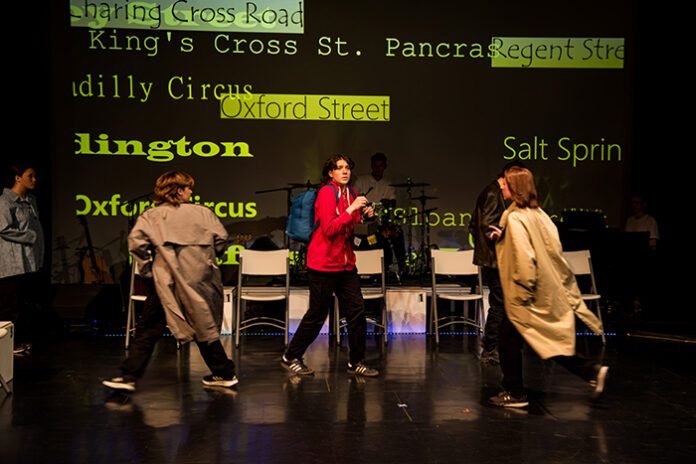BY MARCIA JANSEN
DRIFTWOOD CONTRIBUTOR
The Gulf Islands School of Performance Arts, better known as GISPA, celebrated its 20th anniversary at the end of the school year. Teachers and students at the program’s Gulf Islands Secondary School (GISS) home base talked with me about the program that stands out in many ways.
On the last day of school, GISPA teachers Sonia Langer (dance), Michelle Footz (music) and Jason Donaldson (theatre) and their students gathered for a small birthday and end-of-the-year celebration, complete with a cake and a happy birthday song.
GISPA originated 20 years ago from a discussion between Langer, then music teacher Bruce Smith, Donaldson’s theatre predecessor Christina Pittman and fellow teacher Bo Curtis, who was the producer of two GISS musicals at that time.
“Those musicals, Grease and Little Shop of Horrors, were blockbusters,” Donaldson said. “It was really cool to see that the whole school was flying in the same direction. The science teacher was the stage manager and the sets were built in the wood shop. The musicals played for multiple weekends at ArtSpring and we got a lot of momentum around it.”
At about the same time, the school district was facing declining enrollment and the start of the four-day school week. GISS principal Nancy Macdonald and the school board gave the green light for GISPA, an in- and after-school credit program offering advanced education, as a way to facilitate and attract serious students of dance, theatre and music.
“With the help of coordinator Mitch Howard, who passed away in 2017, we put together this new program,” Donaldson continued. “Providing innovative arts education, integrating music, dance and theatre in ways that are exciting and inspiring; building on a philosophy of student ownership in composition, choreography and design. There is nothing like this program anywhere.”
Steph Cowan, who graduated this year and hopes to go to music school after a gap year, agrees with him.
“GISPA is different from any other class, theatre, dance or music experience in any other school. These inter-connective dynamics you can’t find anywhere.”
“Every year is different, because of the people in the program,” fellow GISPA student Tayler DeBruin added. “Different people and different personalities. We pick our shows based on the people and the talents they have, and we focus on connecting with each person, establishing a collective mind. It creates amazing strong bonds. That’s what makes this program special to me.”
Music teacher Footz joined the program six years ago.
“Our productions are like making a quilt, working with different patches and motives,” she says. “We don’t work in order or in a linear fashion, as we jump around from theme to theme and character to character. It can be a challenging process, especially for new students. I know it will all come together and when they start to see that as well, it is really special.”
Being in GISPA asks for a big commitment from students and teachers alike.
“You get opportunities that you won’t get elsewhere,” said musician Artemis Rome, who has been in GISPA for two years now. “It is not just for a semester, but every single day for a full year. During school, but also several hours outside school.”
Program participants decide on, create, manage and perform in their own productions. Their most recent show was The Curious Incident of the Dog in the Nighttime, adapted from the Simon Stephens play based on Mark Haddon’s novel, and with music composed and performed by GISPA students. Playing gigs in the community and attending shows and workshops in Vancouver and Victoria are additional GISPA experiences.
“We have a strong connection with the Vancouver and Victoria art scene,” Langer said. “Crystal Pite came to Salt Spring and was here for two full days and now she is the biggest name in contemporary dance in the world. She was in our classroom and worked with our students. That was my personal highlight in the past years.”

